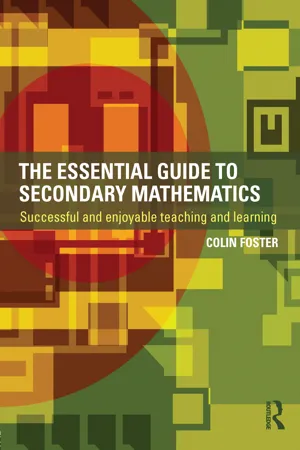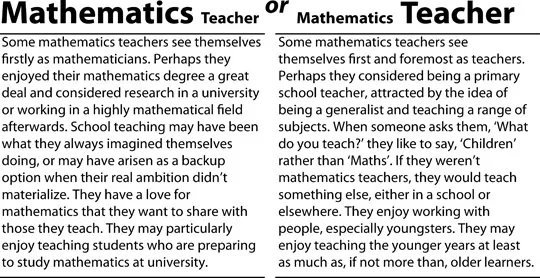Since this is a book about mathematics teaching, let’s begin with some mathematics.
Did you try this task? Throughout this book, there will be different kinds of tasks, some mathematical and some not. Perhaps you have seen it (or a clone of it) before, or used it with learners, maybe recently. The tasks in this book will inevitably be ‘hit and miss’ to some extent; as the reader, you should use this book rather than submit to it. If you don’t find something useful, move on to the next part. Sometimes I find that I am in the mood for working on mathematics; other times I am not. Some tasks immediately grab me; others don’t. Of course, such variations in motivation will be true of the learners we work with as well as of ourselves (Middleton and Spanias, 1999). You will find comments on the mathematical tasks at the end of each chapter.
1.1 Motivation
Mathematics is the queen of the sciences.
Carl Friedrich Gauss
Here is a different kind of task.
Why are you reading this book?
What is your interest in mathematics teaching?
How did you get to this point?
Mathematics teachers come from a variety of backgrounds (Richardson and Watt, 2005). You may be completely new to teaching, or you might be moving to mathematics teaching from teaching something else. Or you might have lots of experience as a mathematics teacher but want to re-think what you do and come at your work in a fresh way. Some mathematics teachers have had a previous career, either in a mathematics-related area or in something else. Some mathematics teachers have mathematics degrees, some have degrees in closely related subjects and some don’t. Whatever your particular background, experiences and interests, these will be your strengths and will help to inform the kind of mathematics teacher that you become. It is sensible to view your past positively, since you can’t change it, and to draw on whatever advantages it may give you.
People have all sorts of reasons for becoming mathematics teachers (Hutchings, 1996). Sometimes it runs in families (Watt et al., 2007), and even though someone’s parents may well have advised them against going into the teaching profession, they did nonetheless. Well-qualified mathematicians are much in demand in a range of occupations, so mathematics teaching is often a conscious choice to accept a significantly lower salary than might be available elsewhere. For some, the termly rhythm and daily hours of the teaching life fit in well with family commitments. For whatever reasons, teaching exerts a powerful draw on many people, often from a young age, at the same time as being widely recognized as a demanding and difficult job.
I admire people who teach maths, but I couldn’t do it myself. I couldn’t stand teaching the same things over and over again.
Research mathematician
What do you think you would be if you weren’t a mathematics teacher?
Some mathematics teachers cannot imagine being anything else: they don’t know what they would do in a world in which mathematics teachers were not required! On the other hand, if you have had a previous career, then this could be your answer. Or perhaps you have a future aspiration and mathematics teaching is something you are doing in between other things. If you weren’t a mathematics teacher, maybe you would do something completely unrelated to mathematics or teaching. However, many mathematics teachers, when asked this question, talk either about something mathematical or something educational.
Figure 1.1 Some stereotypes of mathematics teachers
Figure 1.1 characterizes mathematics teachers as firstly teachers or as firstly mathematicians. Of course, these portraits are stereotypes, and many mathematics teachers will position themselves somewhere between these extremes, but these descriptions may help you to locate your chief motivations in being a mathematics teacher. Understanding this may help you to grow into the sort of mathematics teacher that reflects who you really are.
You can tell an extrovert mathematician because when you’re talking to them they look at your toes rather than theirs.
Old joke
What different difficulties might each of the two stereotypical mathematics teachers portrayed in Figure 1.1 experience in school?
Do you find yourself identifying more closely with one than with the other?
For evidence that mathematicians have something of an image problem in Western society today, you need look no further than popular books and films. Rensaa (2006: 2) comments that ‘a widespread public image of mathematics is that it is difficult, cold, abstract and in many cultures, largely masculine’. Mendick (2002: 44) concludes that ‘The dominant discourse around mathematicians in popular culture depicts them as boring, obsessed with the irrelevant, socially incompetent, male, and unsuccessfully heterosexual’. A study in which children were asked to ‘draw a mathematician at work’ predictably led to a lot of badly-dressed bald white men in glasses (Picker and Berry, 2000). (Although such depictions were highly stereotypical, many of their drawings do look rather like people I know!)
Such a character might be expected to be poorly adapted for life in a classroom, and many beginning mathematics teachers do experience something of a culture shock if they move directly from being an undergraduate mathematics student to teaching ratio to a class of 11-year-olds. Those with a more introverted personality can initially find it difficult to establish a comfortable classroom manner, yet in the end frequently make popular and effective teachers. To be a successful teacher, it is not necessary to try to be like the most outgoing person you know – great teachers come in all types and it is healthy for learners to work with a wide variety of different kinds of adults in school. Learners’ prejudices can become self-perpetuating if only certain types of children think that working with mathematics could be for them. Ideally, within a mathematics department a variety of different types of teachers, male and female, from different backgrounds and with different personalities, will provide role models for many different learners.
At the other end of the spectrum, some teachers seem comfortable in the classroom from the very beginning but lack confidence over their mathematical knowledge. Sometimes teachers are just rusty if they haven’t used some of their mathematics for some years, and they will find it coming back as they go on. Others may need to address their subject knowledge more explicitly, particularly if they are teaching older learners for the first time. Even mathematicians who have been successful in obtaining a university mathematics degree sometimes later say that they don’t feel that they really understood many basic things thoroughly until they began teaching them and dealing with learners’ questions and ideas. Preparing to teach something can be an effective way to learn (or re-learn) it. If you know that you have mathematical weaknesses that could harm your teaching, it is best to be honest about it and begin to address them, perhaps with support from a knowledgeable colleague.
1.2 Mathematics as a subject
Mathematics, rightly viewed, possesses not only truth, but supreme beauty.
Bertrand Russell
It is one thing to enjoy mathematics yourself, as an interest to read books about it, solve puzzles, talk about it, watch television documentaries about it, or use it in your life or work. It is quite another thing to impose mathematics on other people who may not feel the same way about it or think that they need it or can do it. Do mathematics teachers have the right to do that? Mathematics teachers who feel uneasy about this can find it difficult in the classroom when learners do not respond as enthusiastically as they might wish.
Moving from letter to letter, in how many ways can you spell MATHS?
Are you sure that you have found all the possible ways?
Can you be certain that you didn’t miss any? How?
What happens with other words?
Did you do this task? If you did, did you find it fun? Did you think to try palindromic words as well? Do you think that you learned anything from doing it? Is it the sort of task that you would use with learners? For some people, puzzles such as this are enjoyable and interesting in their own right: there is a self-imposed challenge in using your powers to solve something, which many people relish. A lot of mathematics teachers enjoy crosswords or Sudoku puzzles, but no one thinks that these things have worldly importan...








